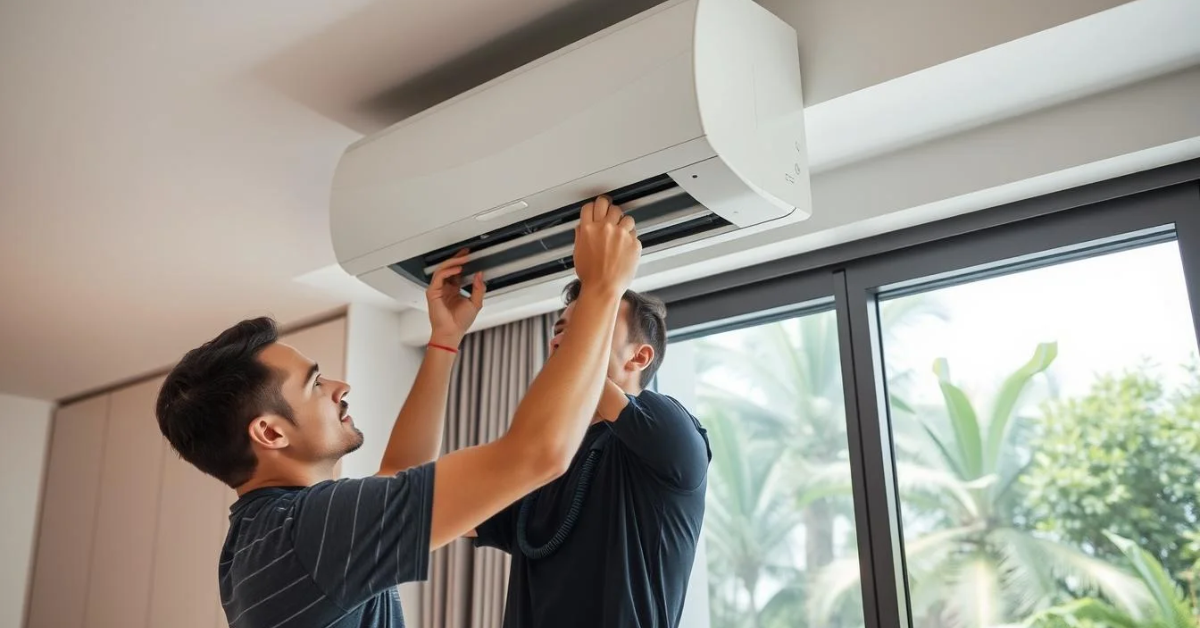Why Regular Aircon Servicing is Essential for Comfort, Health and Cost Savings
When you search for reliable “Aircon Servicing”, what you’re really looking for is more than just a technician popping in to wipe the filters. Proper air-conditioner servicing is a comprehensive process that ensures your cooling system runs efficiently, delivers healthier air and avoids costly breakdowns. In cities and homes where the system works hard almost every day, neglect can cost you far more than a simple check-up.
1. What “aircon servicing” really involves
At its core, an air-conditioning unit is a mechanical system that circulates cool air, removes heat, and filters indoor air. Over time, dust, mould, bacteria, moisture and wear begin to degrade its performance. Regular servicing reverses that decline. Tasks typically include cleaning or replacing filters, removing dust from coils and fins, checking refrigerant levels, flushing drainage lines, inspecting fan motors and electrical connections, and conducting a full test run. A leading service provider in Singapore describes how their premium servicing uses high-temperature steam (up to 145 °C) to remove stubborn dirt, mould and dust mites hidden inside the indoor unit — a deeper clean than a standard wipe-down.
The result? Better airflow, purer air and more reliable cooling.
2. The many benefits to your home, health and wallet
-
Improved indoor air quality. When your aircon is clogged with dust, mould or bacteria, the air you breathe suffers. Cleaning the evaporator coils, filters and drain-pans helps eliminate allergens and microbial build-up — especially important for households with children, elderly residents or those prone to respiratory issues. Studies show that neglected indoor units contribute to poorer air quality.
-
Greater cooling efficiency & reduced energy bills. Dirty filters and coils make the system work harder, using more energy to deliver the same cooling. An authority on home cooling systems states that routine maintenance helps your aircon run as efficiently as possible and helps avoid decline in performance.
-
Fewer unexpected breakdowns and repair costs. Routine servicing helps detect small issues—loose wires, worn fan bearings, blocked drainage—that if ignored become major failures. One HVAC service provider notes that preventive maintenance leads to fewer repairs and less downtime.
-
Extended system lifespan. Just like other equipment, an air-conditioner that’s regularly cared for lasts longer. Unserviced units often fail prematurely, forcing costly replacements sooner than warranted.
-
Healthier, safer living environment. With proper servicing you reduce the risk of leaks, odours, mould growth and dust mite proliferation — all of which degrade comfort and may impact health.
-
Better value for money. The cost of servicing is small in comparison to the cost of replacing a unit or paying inflated electricity bills. In effect, you’re protecting your investment.
3. What good servicing looks like
When the servicing is done well, you’ll notice a clear difference — better airflow, cooler rooms, less noise and no musty smells. A comprehensive service typically follows steps like:
-
Remove and wash air filters, front panels and covers to clear trapped dust and pet hair.
-
Steam-wash or clean indoor evaporator coils and drainage trays to flush out bacteria, mould and hidden dust mites.
-
Vacuum and flush the drain pipe to prevent water leaks due to blockages.
-
Clean outdoor condenser coil, remove debris, brush fins and wash surface to improve heat-release.
-
Check fan bearings, refrigerant levels and compressor pressures.
-
Tighten all electrical contacts and inspect wiring to ensure safety and steady operation.
-
Run a full test cycle, check for cooling performance, airflow and abnormal noises.
When you see a service that goes beyond just cleaning the visible parts, you’re getting real value.
4. How often should you service your air-conditioner?
There are no one-size-fits-all rules, but a good guideline is:
-
General maintenance 2–4 times a year (every 3-4 months) for homes in hot, humid climates or heavy use.
-
Full deep clean (including coils and internal components) at least once or twice a year.
-
If you notice reduced cooling, odd smells, higher bills or water leakage — call a technician sooner rather than later.
In many humid climates, systems work hard and accumulate grime faster, so erring on the side of more frequent service makes sense.
5. What to look out for when choosing a service provider
Not all servicing is equal. To ensure you get a professional job:
-
Confirm the technician is certified and experienced with the type of system you have (split unit, VRV, ducted etc.).
-
Check what the service covers — cleaning coils, drainage, outdoor units, checking refrigerant, tightening contacts — and request an itemised scope.
-
Ask about the cleaning method: chemical washes can leave residues or smells; steam cleaning is a more eco-friendly, chemical-free alternative.
-
Ensure transparent pricing and no hidden costs.
-
Seek a provider who offers advice on maintenance schedule, responsible housekeeping (filter cleaning in between visits etc.).
-
Ask for a test run and demo after servicing so you see the results.
6. Common signs your air-conditioner needs servicing
Be alert for these indicators:
-
The cooling seems weaker than usual, or you need to run the unit much longer to get the same effect.
-
You notice musty or mouldy smells when the unit is running.
-
The outdoor condenser unit looks blocked with debris, leaves or dust accumulation.
-
Water leaking from the indoor unit or pooling at the base — often due to blocked drainage.
-
The unit is noisier than usual — fan motor or bearings may need attention.
-
Your energy bills have jumped despite similar usage — indicating lower efficiency.
If any of these occur, delaying servicing tends to worsen problems and increase cost.
7. DIY actions between professional service visits
While some tasks require a technician, you can still do useful maintenance yourself:
-
Regularly clean or replace the air filter (as per manufacturer’s recommendation). A clogged filter reduces airflow and makes the system work harder.
-
Keep the outdoor condenser unit area clear of leaves, plants or debris and ensure good airflow around it.
-
Monitor the drainage tray: ensure that water isn’t backing up and that the drain line is clear.
-
Keep the indoor unit’s vent and surroundings unobstructed so airflow is free.
-
Pay attention to smells, sounds or performance changes — if you notice something off, schedule a professional service.
These small actions between visits help prolong the benefits of full servicing.
8. The cost-benefit: service now or pay later
It’s easy to skip service when your aircon seems fine — but that’s often when the risks mount. Here’s how the math works: servicing costs a modest amount relative to replacement or high energy bills. For example:
-
An unserviced system may consume significantly more electricity. A clean, efficient system might cut energy use by 10–30% compared to one that’s ignored.
-
Small repairs identified early cost far less than full component failures or whole-system replacement.
-
A properly maintained unit remains reliable, saving you inconvenience, discomfort and possible damage (such as water leakage damaging interiors).
-
If you maintain the unit for its full expected lifespan instead of needing replacement earlier, you get better value from your original purchase.
In essence, regular service is an investment in comfort, health and long-term savings.
9. Tailoring servicing to your climate and usage
If you are in a region with high humidity, constant running seasons or heavy use (for example large offices, retail spaces or homes with many occupants), your servicing schedule will need to be more frequent. Dusty or polluted environments impose extra stress on filters and coils. Systems that run nearly 24/7 (such as server rooms, commercial spaces) demand a stricter maintenance routine. On the other hand, in moderate climates or with lighter usage, you may get by with slightly less frequent check-ups — but you still shouldn’t skip them.
10. Final thoughts: making your air-conditioner an efficient ally
Your air-conditioning unit is a major appliance that silently shapes the comfort, health and cost-efficiency of your living or working space. When you commit to regular servicing, you ensure it doesn’t just function — it performs well. The difference is tangible: cleaner air, faster cooling, lower bills, fewer breakdowns and more peace of mind.
So next time you search for “aircon servicing”, remember that the goal is full-system care — not just a quick filter wipe. Choose a provider who does the job thoroughly, schedule the service proactively and use between-visits maintenance to keep everything running smoothly.







